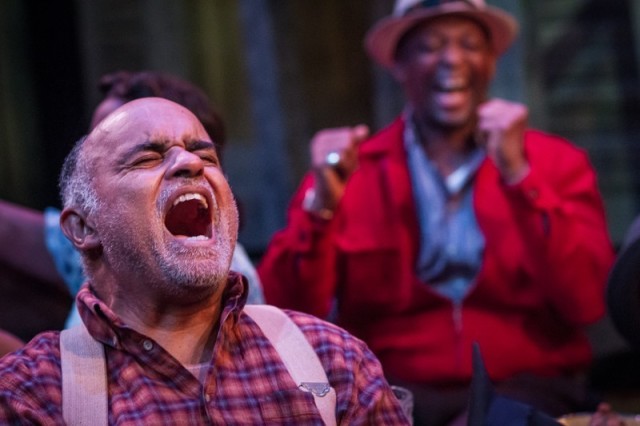Review: Artists Rep's Seven Guitars

Mujahid Abdul-Rashid as King Hedley. Photo by Owen Carey
Editor's Note: Artists Rep just added a show to the sold out run of Seven Guitars this Saturday at 2pm. Now's your chance to snatch up tickets if you missed it before.
Opening with a song of lament, Artist Rep’s production of August Wilson’s Seven Guitars has the slow burn of the blues, its tragedy mounting through its seven players’ rhythm and play, dreams and disappointments, joys turned sour, until it finds release in a kind of self-immolation. And like the blues, it aches to watch, but thanks to the talent of the cast’s actors and a script that finds grand themes in the quotidian flow, it’s a good ache, buoyed by enough hope and redemption to keep us afloat until the final tragedy rains down.
Seven Guitars, along with Profile Theatre’s Mastor Harold … And the Boys, kick off the ten-week August Wilson Red Door Festival, which only confirms that Portland has found its unofficial new bard in the unrivalled voice of the seminal black playwright. Over the past couple years, local audiences have been treated to three lauded productions by Portland Playhouse from Wilson’s Pittsburgh Cycle (or Century Cycle—two of which won Pulitzers), a series of ten plays set one per decade over the course of the 20th century in the poor, mostly black Hill District of Pittsburgh. Seven Guitars is our fourth show from the cycle, and Portland Playhouse will close out the Red Door fest with a fifth, King Hedley II, revisiting some of Guitars characters, in December
Set in 1948, Seven Guitars is the story of seven African-American friends struggling with a world stacked against them, a struggle bookended by a murder. The men have been thrown in jail for ‘worthlessness,’ the women battle just to pay for groceries, and even Floyd “Schoolboy” Barton, a blues singer with a hit record, has nothing to show for it but a pawn receipt for the electric guitar, the very talisman of his success, that he had to let go to pay his bills (a not uncommon experience for black jazz and blues musicians, whose profits often went to their white managers and record execs throughout most of the century). They are filled with triumphant dreams, particularly Barton, but every time they get a foot up, they are cut back down by a society rooted in racism and exploitation.
Certainly, rich humor and small joys lift their days—Brown Bomber Joe Louis’s triumph over the white boxer Billy Conn, the camaraderie of making music—but the emotionally taut play is fueled by foreshadowing, tension, and the mounting realization, with each dog’s bark and flash of weapon, that tragedy is coming. The only question is, will it come from outside, or from within
Like the local Wilson productions before it, the ensemble cast under Kevin Jones’s direction is exceptional. Gayle Samuels as landlady Louise is steely and sassy, her frustrated comic tirade at one point stealing the show. Even beaten down and heartbroken, Ramona Lisa Alexander, who won a Drammy for her performance in the Brother/Sister Plays last season, shines like sun through clouds as Vera, giving another emotionally radiant performance. But the standout for me has to be Mujahid Abdul-Rashid, who gives the show’s most ferocious portrayal as the unstable prophet of sorts, King Hedley. Embodying all the burning anger of a violently oppressed minority, he walks the machete’s edge between dignity and rage, gravitas and simplicity, prophecy and insanity—fitting for a character named for the legendary ragtime cornetist King Buddy Bolden who ended up incapacitated by schizophrenia.
At three hours, the play feels long at times. Lacking some of the focus of Wilson’s other work, its verses meander some through the lives of our seven characters, leaving us a little worn out for when tragedy finally hits. But Wilson’s love for his characters is clear, and it’s hard to begrudge time spent with them.
Though Portland is a long way from Pittsburgh demographically and historically, the lives and themes that make the cycle sing so profoundly were just as present in Portland—the program gives a history of Vanport as Oregon’s own Hill District—and, in fact, it’s their relative invisibility that gives the cycle such relevance for local audiences today.
Seven Guitars plays through November 11 at Artists Repertory Theatre.
